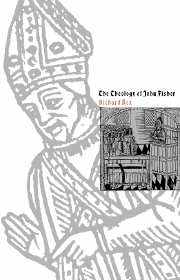Book contents
- Frontmatter
- Contents
- Acknowledgments
- List of abbreviations
- Introduction
- 1 Humanism and scholasticism in late fifteenth – century Cambridge
- 2 The preaching bishop
- 3 Fisher and the Christian humanists, 1500–1520
- 4 The Magdalene controversy
- 5 Fisher and the Catholic campaign against Luther
- 6 Authority
- 7 Faith, grace and justification
- 8 The eucharist
- 9 The inspiration and translation of scripture
- 10 The controversy over Henry VIII's first marriage
- 11 Conclusion
- Appendix John Fisher's library
- Notes
- Bibliography
- Index
5 - Fisher and the Catholic campaign against Luther
Published online by Cambridge University Press: 04 November 2009
- Frontmatter
- Contents
- Acknowledgments
- List of abbreviations
- Introduction
- 1 Humanism and scholasticism in late fifteenth – century Cambridge
- 2 The preaching bishop
- 3 Fisher and the Christian humanists, 1500–1520
- 4 The Magdalene controversy
- 5 Fisher and the Catholic campaign against Luther
- 6 Authority
- 7 Faith, grace and justification
- 8 The eucharist
- 9 The inspiration and translation of scripture
- 10 The controversy over Henry VIII's first marriage
- 11 Conclusion
- Appendix John Fisher's library
- Notes
- Bibliography
- Index
Summary
John fisher's reputation for sanctity depended in his lifetime on the assiduous fulfilment of his episcopal obligations. His academic reputation rested chiefly on the handful of polemical writings that he produced in the 1520s against the Protestant Reformers. It was left to a character assassin named Richard Morison to insinuate that there was a conflict between these two areas of endeavour. In 1535, Morison was persuaded to write in denigration of Fisher and More in an attempt to minimise the damaging publicity that followed their execution. In the course of his effort, Apomaxis Calumniarum, Morison charged the bishop with neglecting his pastoral duties in order to gratify a passion for self-advertisement by posturing as the Church's champion against Luther. As usual, Morison's bluster was comically wide of the mark. Apart from overlooking the fact that, as Stephen Thompson has recently demonstrated, Fisher had a better record of residence than almost all his English episcopal colleagues, the sneer failed to appreciate that Fisher regarded the defence of the faith against heresy as an integral part of the bishop's role. As he said himself,
I intend to confirm the weaker brethren, whose faith has for too long now been poised on the knife-edge between heresy and orthodoxy … It was for their sake that the order to which I belong was everlastingly established … if this flock should perish through our negligence, the blood shall be upon our heads.
The purpose of this chapter is to explore how Fisher pursued this objective as the Church in Europe, and to a lesser extent in England, was threatened by the emergence of Protestant heresies in the 1520s.
- Type
- Chapter
- Information
- The Theology of John Fisher , pp. 78 - 92Publisher: Cambridge University PressPrint publication year: 1991



